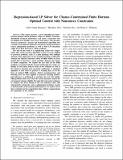Regression-based LP Solver for Chance-Constrained Finite Horizon Optimal Control with Nonconvex Constraints
Author(s)
Banerjee, Ashis; Ono, Masahiro; Roy, Nicholas; Williams, Brian Charles
DownloadRoy_Regression-based.pdf (136.5Kb)
OPEN_ACCESS_POLICY
Open Access Policy
Creative Commons Attribution-Noncommercial-Share Alike
Terms of use
Metadata
Show full item recordAbstract
This paper presents a novel algorithm for finite-horizon optimal control problems subject to additive Gaussian-distributed stochastic disturbance and chance constraints that are defined over feasible, non-convex state spaces. Our previous work [1] proposed a branch and bound-based algorithm that can find a near-optimal solution by iteratively solving non-linear convex optimization problems, as well as their LP relaxations called Fixed Risk Relaxation (FRR) problems. The aim of this work is to significantly reduce the computation time of the previous algorithm so that it can be applied to practical problems, such as a path planning with multiple obstacles. Our approach is to use machine learning to efficiently estimate the objective function values of FRRs within an error bound that is fixed for a given problem domain and choice of model complexity. We exploit the fact that all the FRR problems associated with the branch-and-bound tree nodes are similar to each other, both in terms of the solutions as well as the objective function and constraint coefficients. A standard optimizer is first used to generate a training data set in the form of optimal FRR solutions. Matrix transformations and boosting trees are then applied to generate learning models; fast inference is performed at run-time for new but similar FRR problems that occur when the system dynamics and/or the environment changes slightly. By using this regression technique to estimate the lower bound of the cost function value, and subsequently solving the convex optimization problems exactly at the leaf nodes of the branch-and-bound tree, we achieve 10-35 times reduction in the computation time without compromising the optimality of the solution.
Date issued
2011-06Department
Massachusetts Institute of Technology. Computer Science and Artificial Intelligence Laboratory; Massachusetts Institute of Technology. Department of Aeronautics and AstronauticsJournal
Proceedings of the American Control Conference (ACC), 2011
Publisher
Institute of Electrical and Electronics Engineers
Citation
Banerjee, Ashis Gopal, et al. “Regression-based LP solver for chance-constrained finite horizon optimal control with nonconvex constraints.” American Control Conference (ACC), on O'Farrell Street, San Francisco, CA, USA June 29-July 01, 2011. 131-138.
Version: Author's final manuscript
Other identifiers
INSPEC Accession Number: 12314260
ISBN
978-1-4577-0080-4
ISSN
0743-1619